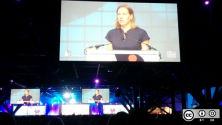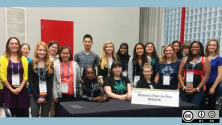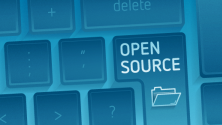Systers is the world's largest email community of women in tech.
First a little history, from Anita Borg.org: Systers was founded by in 1987 as an email mailing list for women in "systems." At last official count, the community has over 5,500 members from at least 60 countries. Women technologists of all ages and at any stage of their studies or careers are welcome to contact the current Systers-keeper, Rose Robinson.
In this interview Rose Robinson talks with me about Systers' participation in the Open Source Day Codeathon taking place at the Grace Hopper Conference (GHC) in Houston, Texas this year—where attendence will hit record numbers. (You can still register!) Systers is one of a group of participating organizations during the codeathon.

What made you decide to participate in the GHC Open Source Day Codeathon?
Open Source Day (OSD) was started and founded at GHC by Systers, Robin Jeffries, Jen Redman, Terri Oda, and Leslie Hawthorn. Those are incredible shoes to fill. To carry on the tradition of Systers, it is always an honor and privilege to participate in OSD, especially at GHC.
Have you attended GHC Open Source Day before?
My first participation in GHC OSD was in GHC 2010 Atlanta. There was only one project we all participated in, and that was Sahana Eden. It was incredible to see everyone working toward helping a great organization and that your contributions were really important no matter how small your contribution. But to contribute as a community was even better.
Tell us about the open source project you'll have attendees work on at the codeathon.
We will have a number of Peace Corps projects and Systers projects. There are mobile apps for Malaria for Peace Corps volunteers, and PowerUp, developed for 12-14 year girls to learn more about their changes during puberty. One of our main projects is Portal, developed in Python/Django. This was built from scratch and has really progressed through our participation in Google Summer of Code. This portal is for our communities to talk about their resources, events, etc so that everyone can be informed and participate. This is our Systers project that the community leaders have really needed and benefited from.
What are your organization's top priorities in the open source community right now?
Systers priorities are always about increasing the number of women in open source. They build their development skills, collaborate with the incredible community working together to solve a problem, and build solutions to get valuable experience that they can take with them to a job, school, or whereever.
There are amazing open source projects and women should definitely be a part of teams that are creating products.
We do leverage Google Summer of Code (GSoC) to gain more contributors and formalize our processes. It is built on mentoring, so we appreciate this component because it is very important to our community. However, we do mentor Systers and women who do not or cannot participate in GSoC and always ensure that there is a professional mentor, a technical mentor, and a program mentor available for that woman. It is about providing a full spectrum of mentoring to benefit our mentees.
What other open source humanitarian projects is your organization working with?
Systers began a partnership with Peace Corps in 2014 to provide the much need technical support through open source projects. It's a nice fit into what projects we want to contribute to that are making an impact in various communities around the world. Systers is a global community with members from more than 60 countries, and Peace Corps projects gives us global awareness to the challenges particularly in developing countries. It is a most rewarding partnership.
How diverse is your project's community?
Although Systers' main focus is to increase women's participation in open source, we do have male allies that participate as mentors and come to us as students in our Systers GSoC program. Our male mentors hail from Japan, France, and Africa; a very committed group and consider themselves as our Brothers. This year we received a record number of applications into our Systers GSoC program from male students. They work with the mail estudents from last year to perform outreach at their schools.
One student in particular who lives in Nigeria, invited Systers to formal hangout sessions in hopes to increase awareness about the program and get more students involved in open source in Africa. Through this outreach, he, along with others, were able to increase participation from students in Africa from 45 least year to 183 this year. We hosted two one-hour sessions where we discussed our projects from last year and this year, plus we did a Q&A and gave advice and tips.
Each year, Systers hosts a flurry of activities at GHC to promote our program and to increase the number of women in open source. In addition to the GHC Open Source Day, we are participating in two panels to discuss our projects and how we participate and lead. During the Community Fair, we'll host office hours and our Systers GSoC mentors and admins will be at the booth.
Series
This article is part of the Grace Hopper Celebration of Women in Computing series for GHC 2015. The annual Grace Hopper Celebration of Women in Computing is designed to bring the research and career interests of women in computing to the forefront. GHC 2015 will be held October 14-16, 2015, in Houston, Texas.







Comments are closed.